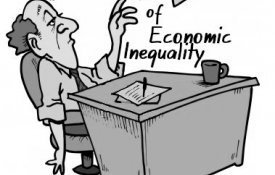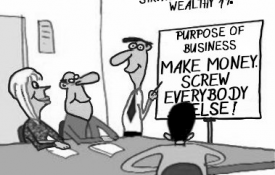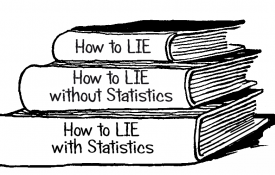Categories
Archive
-
0 Who is addressing economic injustice?
- Society
- by Adrian Mark Dore
- 14-10-2023
0.00 of 0 votesWe are all aware, either explicitly or intuitively, that our economy no longer serves the majority, only the rich. This is a serious problem. Given its seriousness, who’s addressing the problem? You presume some capable and knowledgeable organisations have picked up the baton on our behalf. True, some organisations are tasked with this objective, but are they making any progress, or are they part of a plan to mislead us? Are they helping or delaying our progress towards a more equitable economy? It all sounds a bit far-fetched and conspiratorial to suggest there’s a plan to mislead us but first consider this. We all know economic inequality is growing exponentially. The rich are particularly aware of this and of the difficulty of concealing it from the majority. Therefore, what can they do, considering they want nothing to change but don’t want the majority alarmed by their massive wealth increase? They form organisations to “champion greater economic justice.” They point to these organisations and say, “you see, we acknowledge the problem and are investing in making changes.” This, of course, is just a PR programme to mislead people into thinking the rich and influential are concerned and addressing the problem when they are not. This is how the wealthy tackle obvious problems that can’t be denied or brushed under the carpet. They create organisations with false agendas and publicise them as “working towards a solution” while doing nothing. They used the same approach to hide the fact that the Accounting Model as a business measurement standard is inadequate and inappropriate. (See my article “Economic Apartheid is caused by the Accounting Model” for more details.) They set up numerous organisations tasked with finding a “solution.” These organisations make a pretence of being busy while doing nothing. They hold annual conferences, calling on the rich and powerful to attend while talking nothing but rubbish. It’s similar to the World Economic Forum’s annual Davos meetings, except these organisations focus on their particular subject. Davos sprouts general economic rubbish. It’s all based on the same PR platform of “talking the good talk while doing nothing.” Returning to economic inequality and the organisations supposedly "fighting for change," I will present you with certain facts and let you judge whether or not they have done anything. Our economy is run (mainly) following the principles of free markets, based on Milton Friedman's "Shareholder Theory". This states that the sole purpose of business is to create shareholder value. You now know why the rich have everything and the majority struggle. In 1984 Edward Freeman proposed "Stakeholder Theory." Stakeholder Theory argues that businesses perform better over the long term when they serve all stakeholder needs - providing a balanced approach to development. However, thirty-nine years later, we are no further forward in adopting a more balanced approach than the day Freeman announced his beliefs. This shows the abject level of greed and short-sightedness which exists. When somebody holds the purse strings, they will not let go of them, despite knowing somewhere in the recess of their brain that a fairer and more balanced approach will be better for everybody in the long run. Some argue that I am wrong and that many businesses have adopted a "Stakeholder" approach. This is entirely incorrect. The only businesses which can afford to adopt a stakeholder approach are privately owned and funded businesses. This is because Shareholder Theory is institutionalised into our economy through our measurement standard. Our business measurement standard is based on financial measures, which place short-term profit creation for shareholders at the core of everything they do. All other measures are ignored because they are not universally comparable. They are valueless. All listed companies and those seeking external investment and credit must produce strong financial results to attract investment and borrowing. To improve their financial results, they rob stakeholder value to attract investors and get the lowest borrowing rates. Therefore, only businesses not seeking external financial support or not already reliant on it can adopt a stakeholder approach. That means very few businesses. Therefore, if you are going to change from Shareholder to Stakeholder Theory, you will have to replace existing measurement standards with a fully inclusive, balanced, and comparable measurement standard. This will stop businesses from robbing stakeholders to bolster shareholder results, as a complete picture of business performance will be presented and audited. Not a partial and one-sided picture. With the above understanding in mind, are any organisations "fighting for greater economic equality" calling to replace our inadequate and inappropriate measurement standard. This is the most fundamental issue facing them. These organisations know Shareholder Theory is institutionalised into our economy through our business measures. Therefore, introducing more balanced measures is the only way to address the problem. Measures that look after all stakeholder and shareholder needs, and are universally comparable. I pointed this out to two of the most prominent "economic equality" groups - "Inclusive Capitalism" and "Conscious Capitalism" some years ago. However, this does not appear on their agendas in a clear and unequivocal way, such as, "We require a complete revamp of our business measurement standard as the most critical step in ensuring a balanced economy." You can only make business more "inclusive" or "conscious" of another stakeholder's needs when you measure and manage them effectively. If any organisation is serious about addressing inequality, they should plough all their efforts and resources into looking for an alternative measurement framework. Unless we change what we measure and manage, nothing changes. If they are not doing this, I can only assume they are not looking for a solution, only pretending to do so. You be the judge. Where does that leave us? On our own, but at least we are no longer deluded about who is supporting and misleading us. You may read other articles by Adrian Dore on Medium at https://medium.com/@adrianmarkdore/
-
0 Why the purpose of business affects you.
- Society
- by Adrian Mark Dore
- 19-02-2023
0.00 of 0 votesThis statement may appear obscure and of little interest to you. After all, who cares about the purpose of business? It certainly won't top most philosophically minded people's to-do lists, but perhaps it should. I'm sure it's on the list of those concerned with our socioeconomic and environmental problems. Some may think there are more profound and interesting questions to answer. There are, but the most fundamental consideration is how we sustain and provide for ourselves. Our employment provides the means to sustain us, and business provides employment. Therefore, the purpose of business must be one of the most basic and important questions we should consider, as it affects us all. Milton Friedman, a founding father of neoliberalism (or free market economics) and a Nobel laureate, described the purpose of business as “serving the needs of shareholders as the sole purpose of business.” I need not remind you that we live under the yoke of free market economic policies and, thus, under Friedman’s narrow and almost incomprehensible belief in the purpose of business. In our modern and enlightened era, to think that the sole purpose of business is to serve shareholder needs is incomprehensible. To have thought this fifty years ago is equally unfathomable. How stupid can we be to make the world’s resources available to business so that only shareholders may benefit? That’s absurd, but it doesn’t end there. We reward this absurdity with a Nobel prize for economics. The highest accolade for an idea that calls for rules and regulations protecting us and the environment to be removed so shareholders may exploit and plunder these resources. Surely, we can’t be that stupid to believe that this unfair and imbalanced practice would not cause serious social and environmental harm. Perhaps they could not have perceived the full extent of the damage, but not to have realised it would cause serious damage is nonsense. I leave it to your good judgement to determine their motives in supporting the incomprehensible. Peter Drucker, often referred to as "the founder of modern business management", said the purpose of business is to create customers. Again, this is an important issue in sustaining business. Some people have taken the two ideas of "shareholder reward" and "customer satisfaction" and combined them, claiming that they make up the purpose of business. They say, "the fundamental business purpose requires a business to use revenues and capital to produce customer satisfaction to reward capital providers." Yes, we need to reward capital providers and customers for business to succeed, but what should be equally obvious is that they are not the only stakeholders in business. Other stakeholders contribute as much, if not more. The environment provides the raw materials, without which nothing happens. Society provides labour, who, without their knowledge, diligence, and skills, nothing happens. If we don't reward all stakeholders over the long term, business will fail. In determining the real purpose of business let's return to Peter Drucker, who said: "the purpose of business lies in society, since a business enterprise is an organ of society." He got that part right. Building on the idea that business is an organ of society, we can conclude that the purpose of business must be to serve the interests of society. For a business to survive, it has to reward all constituents or stakeholders - that's just plain obvious. The rewards or benefits it must pay each stakeholder varies. Profit for shareholders, wages, job security and satisfaction for staff, protection and nurturing of the environment for the environment, etc. From the perspective of each stakeholder, including shareholders, their rewards may appear to be the purpose of business. It's certainly the purpose or reason they entered or became involved in business. In ensuring all stakeholders and shareholders are rewarded according to their contribution, there will be conflicts of interest amongst constituents. To resolve these conflicts, we must turn to the real purpose of business, which is to benefit society. Therefore, decisions should be framed in language like this: "what outcome best serves the interests of society without unduly denying other constituents of their just rewards?" This acknowledges the relationship between society and the environment; we cannot destroy what sustains us. We need to protect all life on earth. Right now, we frame our decision-making in a different language - "what best serves shareholder interest?" No wonder we are in such a mess. Now that we understand the purpose of business, we have to correct the massive imbalances in our economy. We need to change our inadequate and inappropriate business measurement standard so that we can measure and manage all stakeholder interests to make informed decisions. Only when we introduce a balanced measurement standard will we be able to make informed decisions which best serve society, thus achieving the true purpose of business. See my article "Economic Apartheid is caused by the Accounting Model" for more details. Major social and environmental changes will only happen when we align business objectives with those of society and the environment. This misalignment lies at the heart of our problems. That's why knowing and agreeing on the purpose of business is so important. What I've said here is nothing new. Frankly, it's just plain common sense. So why does there appear to be some confusion as to the purpose of business? It's not because business leaders don't know. It's because the wealthy one per cent want to mislead us and confuse the issue. They don't want to change. They want Milton Friedman's "half-baked" ideas to prevail, not because they are correct, but because they serve their narrow interests well. You may read other articles by Adrian Dore on Medium at https://medium.com/@adrianmarkdore/
-
0 Quality-of-life in freefall. The measure the rich don’t want you to see.
- Society
- by Adrian Mark Dore
- 18-02-2023
0.00 of 0 votesWe live in a democracy, so we assume our government and economy serve us. But things don't seem or feel right. We are unable to put our finger on the problem. We know we are being misled and lied to. That much is obvious, but how are they doing this so effectively? They use measures - the wrong measures to mislead us. They use measures that serve their needs, not ours, and tell us these are the correct and only valid measures. They constantly point to these measures, telling us things are going well. They are for them (the rich) but not for us, the poor majority. If you want to control and influence the economy, the best way is through measures, as measures dictate outcomes. What you measure is what you get. If you don't measure something, it means you don't care about it, and don't manage it. The rich only measure financials as that's all they care about. The rest is unimportant to them. As a result, they produce strong financials with no regard for anything else. Yet, it is these other things which concern us most. At a macroeconomic level, they use GDP, and at a business level, the Accounting Model's profit & loss. These are the measures we live by. Yet, these measures cannot be an indication of society's true well-being by the longest stretch of the imagination. At best, they are meaningless. In other articles, I deal with these two measures to show how appalling and harmful they are. However, this article is about another two important measures. One is bandied about fairly frequently by the wealthy, who use it incorrectly to try and prop up the lie that they and their systems are serving us well. They tell us we should be grateful to them for how well they are doing for us in difficult times. What absolute rubbish. We are doing badly, and they are hiding the truth from us. The measure they bandy around is standard-of-living. Little or no mention is made of the more important measure, quality-of-life. This article explains both these measures, their importance and difference, and how the quality-of-life measure is a true indicator of how much worse off we are today than decades ago. Standard-of-living and Quality-of-life. The wealthy have deliberately conflated these two terms to hide the fact that while standard-of-living is rising, quality-of-life is falling rapidly. While both measures are important, quality-of-life is far more important to us. We need to be clear about what these two measures measure, as the first step in discrediting the lies we are fed. Standard-of-living. Standard-of-living refers to products and services made available to citizens of a particular country or region. These are products and services which affect our living standards. They are represented by a "basket" of products similar to the basket idea used in calculating the Retail Price Index (RPI) to gauge inflation. Obviously, the products and services in the "basket" are entirely different and represent what the average person uses. They represent products and services that are available, affordable, within the average citizen's financial reach and in general use. The basket is divided into categories, which are then subdivided into subcategories. Within these subcategories, the products and services comprising the subcategory are listed. Each product/service is scored by its availability and affordability. These scores are combined to give an overall score. The product/service is then weighted by its importance within the subcategory, and a final score is calculated. Scores are then aggregated, and a final index score is determined. This describes the principle of the index in broad terms only. The categories comprising the index are: - ● Home, ● Food, ● Clothing, ● Travel, ● Entertainment, ● Communication. As you have gathered, standard-of-living is influenced by business. They are responsible for introducing new products into categories, improving them, lowering their costs, and making them more affordable and readily available. This, in turn, improves the standard-of-living index. The higher the index, the better. Government plays an important part in creating a favourable and supportive environment that allows all this to happen, but it's businesses who "deliver the goodies." They improve our standard-of-living through innovation and competitiveness. Quality-of-life. Quality-of-life deals with the different aspects that directly affect our lives. These different aspects are influenced by the government, which formulates policies and implements laws, procedures, and practices to regulate the context in which they operate to benefit its citizens. It includes such things as shown below: - Quality-of-life is also calculated as an index by measuring categories and sub-categories, to determine the individual and overall direction of the index. What is happening here in the UK is mirrored across most, if not all, developed economies. In the UK, we are facing a significant decline in quality-of-life, as reflected below. The above paints a bleak picture of decline across virtually all measures. No wonder there is such public unease and discontent. Now you can understand why vested interests conflate these two measures and generally muddy the waters regarding what each should measure. They do all this to hide the unpalatable truth that only standard-of-living is doing well. This is because it's in their interest to keep improving products and services. The other is doing appallingly. Big government and decent tax margins are needed to build a high quality-of-life for the majority. However, this is precisely what vested interests don't want. As they get their way, quality-of-life will decline further and faster. Quality-of-life is one of the key indicators that should steer government decision-making, not GDP. You may read other articles by Adrian Dore on Medium at https://medium.com/@adrianmarkdore/


